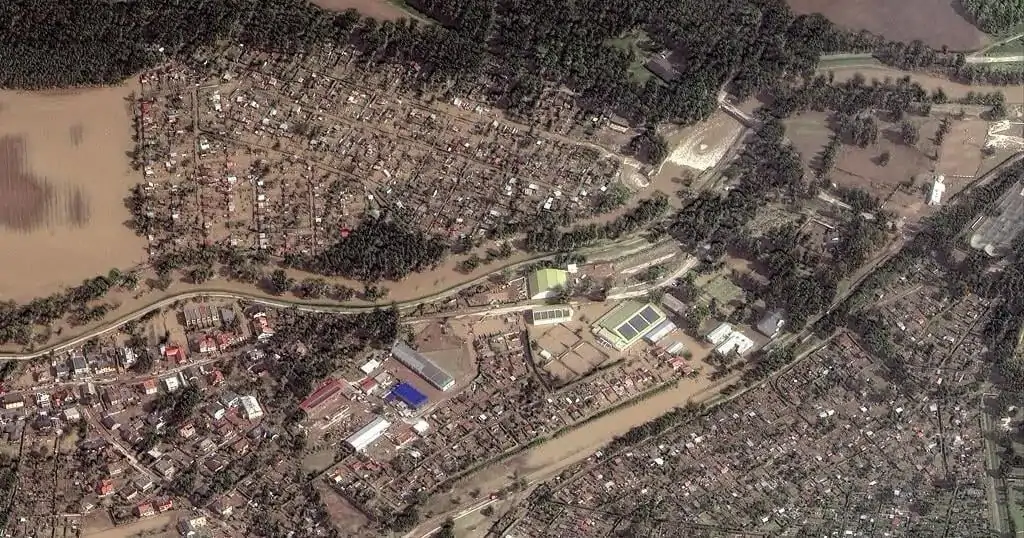WARSAW, Poland (AP) — European Union chief Ursula von der Leyen on Thursday pledged billions of euros in aid for Central European countries that suffered enormous damage to infrastructure and housing during the massive flooding that has so far claimed 24 lives in the region.
Von der Leyen paid a quick visit to a flood-damaged area in southeastern Poland and met with heads of the governments of the affected countries — Poland, Austria, the Czech Republic and Slovakia.
She said funds will be made available quickly for infrastructure repair from the EU’s solidarity fund, as well as 10 billion euros ($11 billion) from what is called the cohesion fund — for the most urgent repairs. In a special approach, no co-financing will be required from these countries for the money to be released.
“Here we say it’s 100% European money, no co-financing,” von der Leyen told a news briefing. “These are extraordinary times, and extraordinary times need extraordinary measures. ”
Meanwhile, a massive flood wave threatened new areas and heavy rains also caused flooding and evacuation of some 1,000 people in the northern Italian region of Emilia-Romagna. In Central Europe, the receding waters revealed the scale of the destruction caused by exceptionally heavy rains that began a week ago.
Czech Interior Minister Vit Rakušan said one more person was reported killed on Thursday in the country’s hard-hit northeast, bringing the death toll there to five. There were also seven deaths each in Poland and Romania, and five in Austria — with the overall death toll now at 24.
Authorities deployed troops to help. In the northeastern Czech Republic, soldiers joined firefighters and other emergency crews to help with the recovery efforts. Army helicopters distributed humanitarian aid while soldiers were building temporary bridges in place of those that were swept away.
Some 400 people remained evacuated from the homes in the regional capital of Ostrava. In the southwest, the level of the Luznice River reached an extreme high but the evacuation of 1,000 people in the town of Veseli nad Luznici was not necessary for the moment, officials said.
Cleanup efforts were underway in Austria, where flooding washed away roads and led to landslides and bridge damage. Firefighters and soldiers pumped water and mud out of houses and disposed of damaged furniture, broadcaster ORF quoted fire department spokesperson Klaus Stebal as saying.
The governor of Lower Austria province, Johanna Mikl-Leitner, said reconstruction was expected to take years, according to the Austria Press Agency.
The Vienna public transport company has had to pump almost 1 million liters (260,000 gallons) of water since last weekend. Ten towns and areas were still inaccessible on Thursday, APA reported.
In Hungary, flood waters continued to rise as authorities closed roads and rail stations. Ferries along the Danube River halted. In the capital, Budapest, water spilled over the city’s lower quays and threatened to reach tram and metro lines. Some transport services were suspended.
Further upriver, in a region known as the Danube Bend, homes and restaurants near the riverbanks were inundated.
Nearly 6,000 professionals, including members of Hungary’s water authority and military, were mobilized, and prison inmates were involved in filling sandbags, Prime Minister Viktor Orbán said at a news conference Thursday.
The Danube stood at over 771 centimeters (25 feet), approaching the 891-centimeter (29.2 feet) record set during major flooding in 2013.
In southwestern Poland, the high waters reached the city of Wroclaw and an extended wave was expected to take many hours, even days to pass, exerting pressure on the embankments.
The water level on the Oder River just before Wroclaw was 6.4 meters (21 feet), some 2 meters (6.5 feet) above alarm levels but still lower compared to the disastrous flooding in 1997.
In the two most-affected towns, Stronie Slaskie and Ladek-Zdroj, tap water and power were restored, said Gen. Michal Kamieniecki, who was put in charge of the recovery operations there after an emotional appeal to Prime Minister Donald Tusk for help the day before by a young woman identified only as Katarzyna.
As concerns mounted, Tusk invited von der Leyen to Wroclaw to see the situation first hand. Government leaders from the Czech Republic, Slovakia and Austria were also there.
In Italy, rivers flooded in the provinces of Ravenna, Bologna and Forlì-Cesena, as local mayors asked people to stay on the upper floors or leave their houses. Those areas were hit by devastating floods in 2023, when more than 20 rivers overflowed, killing 17 people.
Italy’s vice minister for transport and infrastructure, Galeazzo Bignami, said Thursday that two people were reported missing in Bagnocavallo, in Ravenna province.
At least 800 residents in Ravenna and almost 200 in Bologna province spent the night in shelters, schools and sports centers. Trains were suspended and schools closed while residents were advised to avoid travel.
___
Associated Press writers Justin Spike in Budapest, Hungary, Karel Janicek in Prague and Giada Zampano in Rome contributed to this report.

























